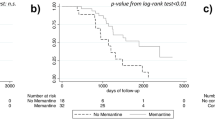Abstract
Background
A possible association between benzodiazepine use and Alzheimer’s disease (AD) has been hypothesized in previous studies.
Objectives
Using claims data from the Helsana Group, a large Swiss health insurance provider, we examined the association between previous benzodiazepine use and the risk of AD.
Methods
We conducted a matched case-control study and identified 1438 incident AD cases between 2013 and 2014 based on recorded first-time use of drugs used to treat AD [i.e., acetylcholinesterase inhibitors (donepezil, rivastigmine, and galantamine) and the N-methyl-d-aspartate receptor antagonist memantine] and matched one control to each case on age, sex, index date, and residence (canton). Because the initiation of benzodiazepine use shortly before the AD diagnosis date may occur as a result of symptomatic treatment of prodromal symptoms of early major neurocognitive disorder, we introduced an induction period of 2 years before the AD diagnosis date. Additionally, we categorized medication use by duration of use prior to the index date using prescriptions. We applied conditional logistic regression analyses to calculate odds ratios with 95% confidence intervals and adjusted for use of antidepressants.
Results
The crude odds ratio (95% confidence interval) of developing AD for patients starting benzodiazepine treatment was 1.71 (1.17–2.99) in the year before diagnosis and 1.19 (0.82–1.72) in the third year before diagnosis. After accounting for benzodiazepine use initiated during the prodromal phase, benzodiazepine use was not associated with an increased risk of developing AD; long-term benzodiazepine use (≥30 prescriptions) yielded an adjusted odds ratio of 0.78 (0.53–1.14).
Conclusions
After taking into consideration a possible protopathic bias in the 2 years preceding the AD diagnosis date, benzodiazepine use was not associated with an increased risk of developing AD.


Similar content being viewed by others
References
Schweizerische Alzheimervereinigung. Priorität Demenz-116000 Menschen mit Demenz in der Schweiz. alzheimer. 2014.
Reitz C, Brayne C, Mayeux R. Epidemiology of Alzheimer disease. Nat Rev Neurol. 2011;7(3):137–52.
Biétry F, Schur N, Pfeil A, et al. Helsana Arzneimittelreport. 2015. 1–200.
Olfson M, King M, Schoenbaum M. Benzodiazepine use in the United States. JAMA. 2015;72(2):136–42.
World Health Organization. WHO Collaborating Centre for Drug Statistics Methodology. The Anatomical Therapeutic Chemical (ATC) and defined daily dosing (DDD) system. http://www.whocc.no/atcddd/. Accessed 27 Jun 2014.
Beurdeley-Thomas A, Miccoli L, Oudard S, et al. The peripheral benzodiazepine receptors: a review. J Neurooncol. 2000;46(1):45–56.
Moller HJ. Effectiveness and safety of benzodiazepines. J Clin Psychopharmacol. 1999;19(6 Suppl 2):2S–11S.
Dold M, Li C, Tardy M, et al. Benzodiazepines for schizophrenia (review). In: Dold M, editor. Cochrane Database of Systematic Reviews. Chichester: Wiley; 2012.
Documed AG. Compendium. http://www.documed.ch. Accessed 3 Feb 2016.
Chan AW. Effects of combined alcohol and benzodiazepine: a review. Drug Alcohol Depend. 1984;13(4):315–41.
Jones JD, Mogali S, Comer SD. Polydrug abuse: a review of opioid and benzodiazepine combination use. Drug Alcohol Depend. 2012;125(1–2):8–18.
Owen RT, Tyrer P. Benzodiazepine dependence: a review of the evidence. Drugs. 1983;25(4):385–98.
Schweizer E, Rickels K. Benzodiazepine dependence and withdrawal: a review of the syndrome and its clinical management. Acta Psychiatr Scand Suppl. 1998;393:95–101.
Holt S, Schmiedl S, Thürmann PA. PRISCUS-Liste potenziell inadäquater Medikation für ältere Menschen. 2011.
American Geriatric Society. AGS Beers criteria for potentially inappropriate medication use in older adults. Am Geriatr Soc; 2012.
Pisani M, Murphey T, Araujo KLB, et al. Benzodiazepine and opoid use and the duration of ICU delirium in an older population. Crit Care Med. 2009;37(1):177–83.
Buffett-Jerrott SE, Stewart SH. Cognitive and sedative effects of benzodiazepine use. Curr Pharm Des. 2002;8(1):45–58.
Parsons C, Johnston S, Mathie E, et al. Potentially inappropriate prescribing in older people with dementia in care homes: a retrospective analysis. Drugs Aging. 2012;29(2):143–55.
Gallini A, Andrieu S, Donohue JM, et al. Trends in use of antipsychotics in elderly patients with dementia: impact of national safety warnings. Eur Neuropsychopharmacol. 2014;24(1):95–104.
Wu C-S, Wang S-C, Chang I-S, Lin K-M. The association between dementia and long-term use of benzodiazepine in the elderly: nested case-control study using claims data. Am J Geriatr Psychiatry. 2009;17(7):614–20.
Chen PL, Lee WJ, Sun WZ, et al. Risk of dementia in patients with insomnia and long-term use of hypnotics: a population-based retrospective cohort study. PLoS One. 2012;7(11):e49113.
Wu CS, Ting TT, Wang SC, et al. Effect of benzodiazepine discontinuation on dementia risk. Am J Geriatr Psychiatry. 2011;19(2):151–9.
Lagnaoui R, Begaud B, Moore N, et al. Benzodiazepine use and risk of dementia: a nested case-control study. J Clin Epidemiol. 2002;55(3):314–8.
Billioti de Gage S, Begaud B, Bazin F, et al. Benzodiazepine use and risk of dementia: prospective population based study. BMJ. 2012;345:e6231.
de Gage SB, Moride Y, Ducruet T, et al. Benzodiazepine use and risk of Alzheimer’s disease: case-control study. BMJ. 2014;349:g5205.
Gallacher J, Elwood P, Pickering J, et al. Benzodiazepine use and risk of dementia: evidence from the Caerphilly Prospective Study (CaPS). J Epidemiol Commun Health. 2012;66(10):869–73.
Imfeld P, Bodmer M, Jick SS, Meier CR. Benzodiazepine use is not associated with an increased risk of Alzheimer’s disease or vascular dementia: case-control analysis. Drug Saf. 2015;38(10):909–19.
Gray SL, Dublin S, Yu O, et al. Benzodiazepine use and risk of incident dementia or cognitive decline: prospective population based study. BMJ. 2016;352:i90.
Amieva H, Le Goff M, Millet X, et al. Prodromal Alzheimer’s disease: successive emergence of the clinical symptoms. Ann Neurol. 2008;64(5):492–8.
Stella F, Radanovic M, Balthazar MLF, et al. Neuropsychiatric symptoms in the prodromal stages of dementia. Curr Opin Psychiatry. 2014;27(3):230–5.
Richard E, Reitz C, Honig LH, et al. Late-life depression, mild cognitive impairment, and dementia. JAMA Neurol. 2013;70(3):383.
Horwitz RI, Feinstein AR. The problem of “protopathic bias” in case-control studies. Am J Med. 1980;68(2):255–8.
Wu CS, Lin YJ, Liu SK. Benzodiazepine use among patients with schizophrenia in Taiwan: a nationwide population-based survey. Psychiatr Serv. 2011;62(8):908–14.
Helsana Gruppe. http://www.helsana.ch/. Accessed 31 Aug 2016.
Biétry F, Pitzurra R, Schwenkglenks M, Meier C. Helsana-Arzneimittelreport. 2014. 1–200.
Mehra T, Müller CTB, Volbracht J, et al. Predictors of high profit and high deficit outliers under SwissDRG of a tertiary care center. PLoS One. 2015;10(10):e0140874.
Busse R, Geissler A, Quentin W, Wiley M, editors. Diagnosis-Related Groups in Europe: moving towards transparency, efficiency. 1st ed. Maidenhead: McGraw-Hill, Open University Press; 2011.
SwissDRG. Abrechnungsversion Swiss Diagnosis-Related Groups. Vol. 1. http://www.swissdrg.org. Accessed 19 Dec 2016.
Emre M, Aarsland D, Albanese A, et al. Rivastigmine for dementia associated with Parkinson’s disease. N Engl J Med. 2004;351(24):2509–18.
Henderson EJ, Lord SR, Brodie MA, et al. Rivastigmine for gait stability in patients with Parkinson’s disease (ReSPonD): a randomised, double-blind, placebo-controlled, phase 2 trial. Lancet Neurol. 2016;15(3):249–58.
Schweizerische Parkinsonvereinigung. Parkinson Schweiz. http://www.parkinson.ch. Accessed 12 Oct 2016
García-Herranz S, Díaz-Mardomingo MC, Peraita H. Neuropsychological predictors of conversion to probable Alzheimer disease in elderly with mild cognitive impairment. J Neuropsychol. 2016;10(2):239–55.
Hogan DB, Fiest KM, Roberts JI, et al. The prevalence and incidence of dementia with Lewy bodies: a systematic review. Can J Neurol Sci. 2016;43(S1):S83–95.
Acknowledgements
This work was supported by the Department of Health Sciences, Helsana Group, Zurich, Switzerland. The authors thank Mathias Frueh for computer programming.
Author information
Authors and Affiliations
Corresponding author
Ethics declarations
Funding
The project was partially funded by the Helsana Group, Switzerland.
Conflict of interest
All authors meet the International Committee of Medical Journal Editors requirements for authorship, and each author confirms that the manuscript represents honest and original work. All versions of the manuscript were reviewed and approved by all authors. The data have partially been reported in a document in German in Switzerland produced by the Helsana Group (‘Helsana Arzneimittelreport’). The authors have no conflicts of interest to declare.
Author Contributions
Biétry FA: Study conception and design, statistical analysis and interpretation of data, drafting the manuscript. Pfeil AM: Study conception and design, statistical analysis. Reich O: Editing the manuscript. Schwenkglenks M: Study conception and design, editing the manuscript. Meier CR: Study conception and design, acquisition of data, analysis and interpretation of data, editing the manuscript.
Rights and permissions
About this article
Cite this article
Biétry, F.A., Pfeil, A.M., Reich, O. et al. Benzodiazepine Use and Risk of Developing Alzheimer’s Disease: A Case-Control Study Based on Swiss Claims Data. CNS Drugs 31, 245–251 (2017). https://doi.org/10.1007/s40263-016-0404-x
Published:
Issue Date:
DOI: https://doi.org/10.1007/s40263-016-0404-x




